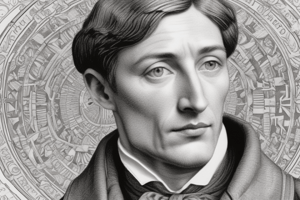Podcast
Questions and Answers
What does the 'smudge' and 'smell' in the poem symbolize?
What does the 'smudge' and 'smell' in the poem symbolize?
The 'smudge' and 'smell' symbolize the negative impact of human actions on nature.
What is the significance of the metaphor of the foot being 'shod'?
What is the significance of the metaphor of the foot being 'shod'?
The metaphor suggests that humans are no longer connected with nature due to their materialistic desires.
What is the significance of the line 'And for all this, nature is never spent'?
What is the significance of the line 'And for all this, nature is never spent'?
It marks a shift in tone and mood, expressing gratitude and hope
How does Hopkins use ellipsis in the poem?
How does Hopkins use ellipsis in the poem?
Flashcards are hidden until you start studying
Study Notes
Poem: God's Grandeur
- The poem celebrates God's greatness and energy that infuses the earth.
- It expresses dismay at mankind's destruction and disregard for God's will.
Themes and Ideas
- God's power and enduring love
- The natural world and its significance
- Criticism of mankind's disrespect towards God and His work
- The idea that nature is never spent despite human destructive tendencies
Poetic Style
- Euphonic alliteration for a pleasing sound effect
- Cacophony (unpleasant sound effects) to convey the effects of human destruction
- Inscape: capturing the essence of the earth and its freshness
- Instress: appreciating God's energy that flows through the natural world
- Form: Petrarchan Sonnet with a clear rhyme scheme and enjambment
Key Quotes and Analysis
- "The world is charged with the grandeur of God. It will flame out, like shining from shook foil;"
- The simile "like shining from shook foil" makes God's energy more tangible and vivid.
- The sibilance is euphonic, creating a pleasing sound effect.
- "It gathers to a greatness, like the ooze of oil Crushed."
- The simile "like the ooze of oil" captures God's force spreading throughout the earth.
- The word "ooze" creates a kinaesthetic image, conveying a steady movement.
- "Generations have trod, have trod, have trod; And all is seared with trade; bleared, smeared with toil;"
- The repetition of "trod" conveys Hopkins' dismay at human destruction.
- The assonance of "seared" and "bleared" is compelling and vivid.
- "And for all this, nature is never spent; There lives the dearest freshness deep down things;"
- The volta (mood shift) occurs here, where Hopkins expresses gratitude for nature's endurance.
- The phrase "dearest freshness deep down things" juxtaposes with human destruction, highlighting God's power.
- "And though the last lights off the black West went Oh, morning, at the brown brink eastward, springs —"
- The image of the sun setting and rising conveys God's pervading presence on earth.
- The word "springs" suggests God's presence is always renewing and revitalizing.
- "Because the Holy Ghost over the bent World broods with warm breast and with ah!bright wings."
- The Holy Spirit is represented as a dove, conveying protection and care for the earth.
- The phrase "broods with warm breast" and "ah!bright wings" creates a vivid and comforting image.
Poem: God's Grandeur
- The poem celebrates God's greatness and energy that infuses the earth.
- It expresses dismay at mankind's destruction and disregard for God's will.
Themes and Ideas
- God's power and enduring love
- The natural world and its significance
- Criticism of mankind's disrespect towards God and His work
- The idea that nature is never spent despite human destructive tendencies
Poetic Style
- Euphonic alliteration for a pleasing sound effect
- Cacophony (unpleasant sound effects) to convey the effects of human destruction
- Inscape: capturing the essence of the earth and its freshness
- Instress: appreciating God's energy that flows through the natural world
- Form: Petrarchan Sonnet with a clear rhyme scheme and enjambment
Key Quotes and Analysis
- "The world is charged with the grandeur of God. It will flame out, like shining from shook foil;"
- The simile "like shining from shook foil" makes God's energy more tangible and vivid.
- The sibilance is euphonic, creating a pleasing sound effect.
- "It gathers to a greatness, like the ooze of oil Crushed."
- The simile "like the ooze of oil" captures God's force spreading throughout the earth.
- The word "ooze" creates a kinaesthetic image, conveying a steady movement.
- "Generations have trod, have trod, have trod; And all is seared with trade; bleared, smeared with toil;"
- The repetition of "trod" conveys Hopkins' dismay at human destruction.
- The assonance of "seared" and "bleared" is compelling and vivid.
- "And for all this, nature is never spent; There lives the dearest freshness deep down things;"
- The volta (mood shift) occurs here, where Hopkins expresses gratitude for nature's endurance.
- The phrase "dearest freshness deep down things" juxtaposes with human destruction, highlighting God's power.
- "And though the last lights off the black West went Oh, morning, at the brown brink eastward, springs —"
- The image of the sun setting and rising conveys God's pervading presence on earth.
- The word "springs" suggests God's presence is always renewing and revitalizing.
- "Because the Holy Ghost over the bent World broods with warm breast and with ah!bright wings."
- The Holy Spirit is represented as a dove, conveying protection and care for the earth.
- The phrase "broods with warm breast" and "ah!bright wings" creates a vivid and comforting image.
Studying That Suits You
Use AI to generate personalized quizzes and flashcards to suit your learning preferences.


